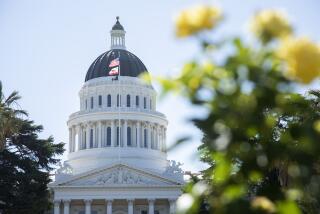$8-Billion Surplus Seen in Budget for This Year
- Share via
WASHINGTON — Proclaiming that the end of federal budget deficits is at hand, the Congressional Budget Office on Tuesday said the government will run an $8 billion surplus this year, 12 months earlier than President Clinton had estimated when he unveiled his balanced-budget plan in February.
The new CBO estimates mark the first official prediction that the first surplus since 1969 will be achieved for this fiscal year.
The news adds fuel to a lively debate in Congress, both between the parties and within them, over how to use the government surplus. That debate is coming to a head as budget writers in both the House and Senate are drafting spending and tax blueprints for the new fiscal year starting Oct. 1.
“We’re now in a position to talk about how do we move into the future,” said House Speaker Newt Gingrich (R-Ga.).
Clinton has been making headway--even among Republicans--with his idea that the surplus be reserved until Congress decides what to do to shore up Social Security, which needs financial help to handle the wave of baby-boomer retirements early in the 21st century. But many Republicans are clamoring for a tax cut, and Gingrich and Rep. John R. Kasich (R-Ohio), House Budget Committee chairman, on Tuesday floated the idea of using the surplus to set up individual retirement accounts for baby boomers.
The transition from red ink to black has been coming more rapidly than policy-makers had ever expected. When Clinton and Congress reached their balanced-budget agreement in mid-1997, they expected deficits to linger until 2002. But the booming economy has continued to bring in far more tax revenues than predicted.
By December, Treasury reports were showing that the government had run a surplus for a 12-month period ending November 1997. The only question was whether that would be sustained for the full 1998 fiscal year, which runs until Sept. 30. Tuesday’s report projects that this will occur.
In January, the CBO had projected that the government would continue running small deficits until 2001. The new estimates said that, thanks to greater than anticipated revenues, the budget would run an $8-billion surplus this fiscal year.
According to the CBO, the surplus would remain relatively small until 2002, when it would jump to $67 billion, rising to $138 billion in 2008.
Sen. Pete V. Domenici (R-N.M.), chairman of the Senate Budget Committee, applauded the news but tried to dampen expectations for what can be done by way of increasing government spending and cutting taxes. At least for the next few years, Domenici said, “we’re talking about a very small amount of money.”
Domenici said he agrees with Clinton that the surplus should not be used for tax cuts or new spending until Congress decides how to revamp Social Security. “That ought to be the highest priority,” he said.
Domenici also argued that any revenues from a cigarette tax increase or proceeds from a settlement this year with tobacco companies over their future legal liability should go to shoring up the Medicare health program.
Domenici is expected to propose a budget resolution that calls for $30 billion in tax cuts over five years--a relatively small amount that would be offset by spending cuts or tax increases in other areas rather than being funded with the surplus.
But other Republicans, particularly conservatives, are clamoring for bigger tax cuts. Rep. David M. McIntosh (R-Ind.) and Sen. John Ashcroft (R-Mo.) have called for using the surplus to eliminate the so-called marriage penalty in current tax law. “There is absolutely no excuse for failing to enact major tax cuts this year,” said Ashcroft.
There is also heavy bipartisan pressure to increase spending for highways and other infrastructure projects.
Gingrich said Republicans could claim credit for the good budget news from CBO, noting that nobody believed it was possible to balance the books when the GOP took control of Congress in 1994. But Democrats said that much of the credit goes to Clinton’s economic policies and his 1993 deficit-reduction initiative.
“For five years this president has put fiscal discipline first,” said Barry Toiv, White House spokesman. “The result is an extraordinary economy and a budget approaching surplus.”
More to Read
Get the L.A. Times Politics newsletter
Deeply reported insights into legislation, politics and policy from Sacramento, Washington and beyond. In your inbox twice per week.
You may occasionally receive promotional content from the Los Angeles Times.











